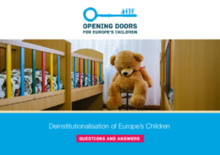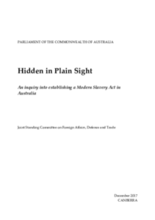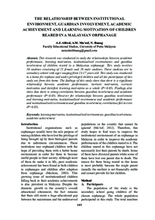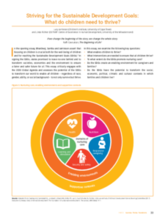Displaying 291 - 300 of 744
This article presents the findings of a study that examined the emotional health status and coping mechanisms of adolescents living in residential care facilities in Malaysia, in comparison with that of adolescents living in families.
The Bucharest Early Intervention Project (BEIP), a randomized controlled trial of foster/family care for young children with a history of institutionalization has provided the context to assess these relationships. This article reviews data from the BEIP with specific focus on attachment.
This session of the World Travel Market in London focused on orphanage tourism and featured speakers from the Better Volunteering Better Care Initiative and other partners, including Save the Children, Friends International, Lumos, and People and Places.
In this video, Catholic Relief Services, Lumos, and Maestral International presented their project: Changing the Way We Care, a project aimed at ending the institutionalization of children.
This resource provides quick answers to some of the frequently asked questions about the transition from institutional to family- and community-based care for children, also known as deinstitutionalisation (DI).
To accompany the release of the learning guide “Deinstitutionalisation of Europe’s Children: Questions and Answers”, the Opening Doors for Europe’s Children has prepared an online quiz to test the knowledge and tackle some of the tricky questions on deinstitutionalisation (DI).
The Australian Parliament has released a Report of its inquiry into establishing a Modern Slavery Act in Australia. This Inquiry Report recognizes orphanage trafficking as a form of modern slavery to be included in the Act.
In this video from Time for Global Action: Advancing the Sustainable Development Goals, Stephen Ucembe shares his experience of living in an orphanage and how institutionalization was detrimental to his development and wellbeing.
This research was conducted to study the relationships between academic performance, learning motivation, institutionalised environments and guardian involvement of children reared in a Malaysian orphanage.
This essay critically engages with the 2030 Global Agenda and assesses the potential of the SDGs to transform our world to enable all children – regardless of race, gender, ability, or social background – to not only survive but thrive.





